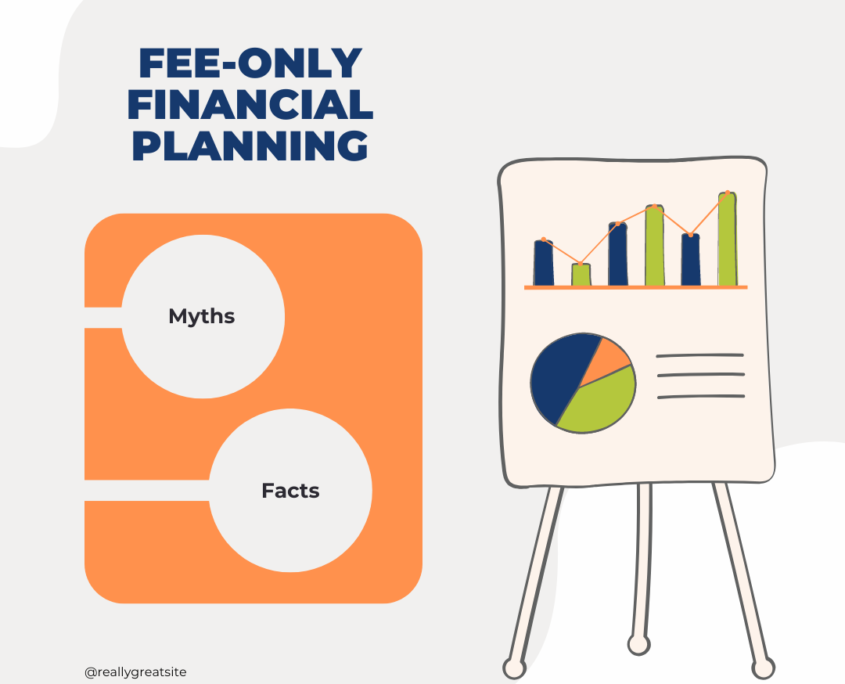Despite it’s growing popularity, there are many fee-only financial planning myths that you should know about.
Below we are going to discuss common misconceptions about working with a fee-only financial planner to help you understand why they might be a great option for helping you reach your ideal financial future.
What Exactly Is Fee-Only Financial Planning?
Fee-only financial planning is a financial advisory service where the advisor is compensated solely by the client, without receiving commissions or incentives from financial product sales. The fee-only model helps reduce conflicts of interest and makes it more likely that the advisor’s advice aligns with the client’s best interests.
Fee-only financial planners typically charge an hourly rate, a flat fee or retainer, or a percentage of assets under management (AUM) deducted from investment accounts being managed by that advisor. Fee-only financial advisors often offer both financial planning and investment management services.
6 Fee-Only Financial Planning Myths
1. Fee-Only Financial Planners Are More Expensive
One common misconception is that working with a fee-only financial planner is more costly than other types of financial advisors. Instead of selling high-fee financial products that pay a commission, fee-only advisors typically charge an hourly rate, a flat fee, a retainer, or a percentage of assets under management (AUM).
Advisors who charge an hourly rate, flat fee, or retainer typically require clients to pay directly from their bank accounts. Paying out of pocket for advice might feel expensive, but the costs are clear, helping you avoid hidden fees that can add up over time.
Additionally, fee-only financial planners can help you save money through budgeting, tax planning, debt elimination as they build your financial plan. They can also help grow your savings through smart asset allocation and investment management, ensuring you get the most out of your retirement savings.
2. Fee-Only Financial Planners Are Only for the Wealthy
Another myth is that fee-only financial planners only work with wealthy individuals. Fee-only advisors do tend to serve wealthier clients since they can easily afford to pay out of pocket for advice. That said, today there are many fee-only advisors that specialize in helping individuals and couples who aren’t yet wealthy and are earlier in their financial planning journey.
Whether you’re just starting to save for retirement or are trying to pay off student loan debt, a comprehensive financial plan created by a fee-only advisor can be a powerful tool in shaping your ideal financial future.
You can find a fee-only advisor specializing in your stage of life on websites like the XY Planning Network, NAPFA (The National Association of Personal Financial Advisors), and the CERTIFIED FINANCIAL PLANNER® Board (CFP®).
3. Fee-Only Financial Planners Only Offer Investment Advice
While investment management is an important part of financial planning, it’s not the only service that fee-only financial planners provide. Fee-only advisors typically help you design a comprehensive financial plan that covers all aspects of your financial life including help with your:
- Spending & Saving
- Tax Planning
- Insurance Planning
- Employer Benefits
- Retirement Planning
- Estate Planning
- And more..
With a fee-only financial planner, you’re not just getting investment advice. You’re getting guidance on how to protect and grow your wealth in a way that aligns with what matters most to you.
4. You Don’t Need a Financial Planner if You’re Already Saving for Retirement
Saving for retirement is important, but it’s only one part of your financial plan. Even if you feel confident in your retirement savings approach, a financial planner can help you double-check that your plan aligns with your short- and long-term goals.
A fee-only planner will also help with key decisions, like when to start Social Security, how to plan for health care in retirement, how to manage your investments to create lasting income, and how to reduce taxes.
Even if you’re diligently saving for retirement, working with a fee-only financial planner can ensure that you are on track for your ideal financial future.
5. Fee-Only Financial Planners Don’t Have Any Conflicts of Interest
While the fee-only model significantly reduces conflicts of interest, it’s not entirely free from them. Financial advisors are still human, so they’ll naturally have their own biases.
Fee-only advisors that collect fees from your investment accounts have conflicts of interest when recommending actions that might reduce your investment balances. For example, if you liquidate investments to pay down debt, your advisor’s fees might decrease because your account balance would be smaller.
However, working with a fee-only financial planner minimizes potential issues because they are paid solely by you, the client, and not through third-party commissions for product sales. If your financial advisor also happens to be a Certified Financial PlannerⓇ professional (CFPⓇ), you can expect an even higher standard of fiduciary responsibility, ensuring your best interests are the priority.
6. Fee-Only Financial Planners Can’t Help With Specific Financial Products
Some people believe that fee-only financial planners can’t provide advice on certain financial products, such as insurance or insurance related investments. While it’s true that fee-only advisors don’t typically sell insurance and earn commissions from selling these products, they can still provide guidance on how these products fit into your overall financial plan.
For example, they might help you evaluate whether a particular insurance policy or annuity makes sense for your situation. With this type of guidance, you can feel confident knowing that your fee-only advisor isn’t motivated to sell you the product if you don’t need it as they can’t earn commissions.
Discover Why a Fee-Only Financial Planner Is Right for You with Stage Ready Financial Planning
At Stage Ready Financial Planning, we specialize in fee-only financial planning for individuals and couples over age 50 in Dayton & Southwest, Ohio. We prioritize objective advice and your best interest at every step of your retirement journey.
Our transparent fees mean no surprises. We’ll help you develop a clear, easy-to-understand plan so you can retire confidently, align your investments with your goals, and live your ideal retirement lifestyle. Schedule your intro call today!
FAQs
Is it worth paying financial advisor fees?
It can definitely be worth it to pay your financial advisor fees if you receive an excess of value in return. The value your advisor creates can be tangible such as advice that helps you grow your investments, achieve financial freedom, or reduce your tax liabilities. Value from your advisor can also be intangible such as peace of mind and partnership in helping you make informed financial decisions.
What is a typical fee for a fee-only fiduciary?
A fee-only financial planner can charge an annual retainer, a flat fee, or hourly rate depending on the complexity of your financial plan. Fees can range from a few hundred dollars for a one-time consultation to several thousand dollars per year for ongoing comprehensive financial planning.
Advisors can also bundle investment management and planning advice for a percentage fee charged based on the size of your investment accounts being managed (AUM). Prospective clients can expect to be charged fees that range from .5%-1.5% annually.

